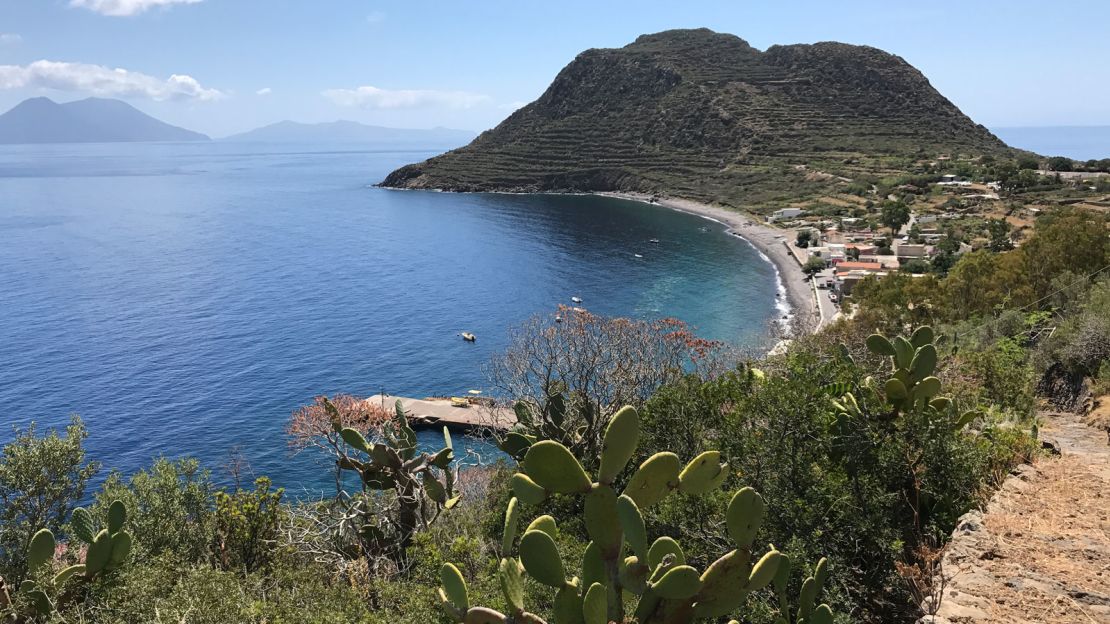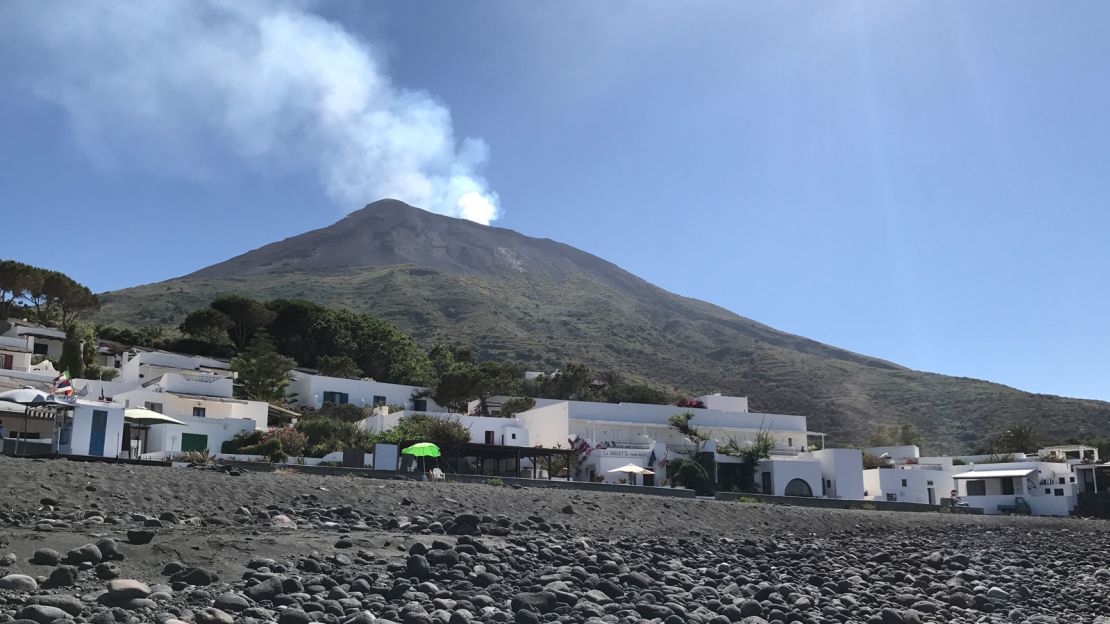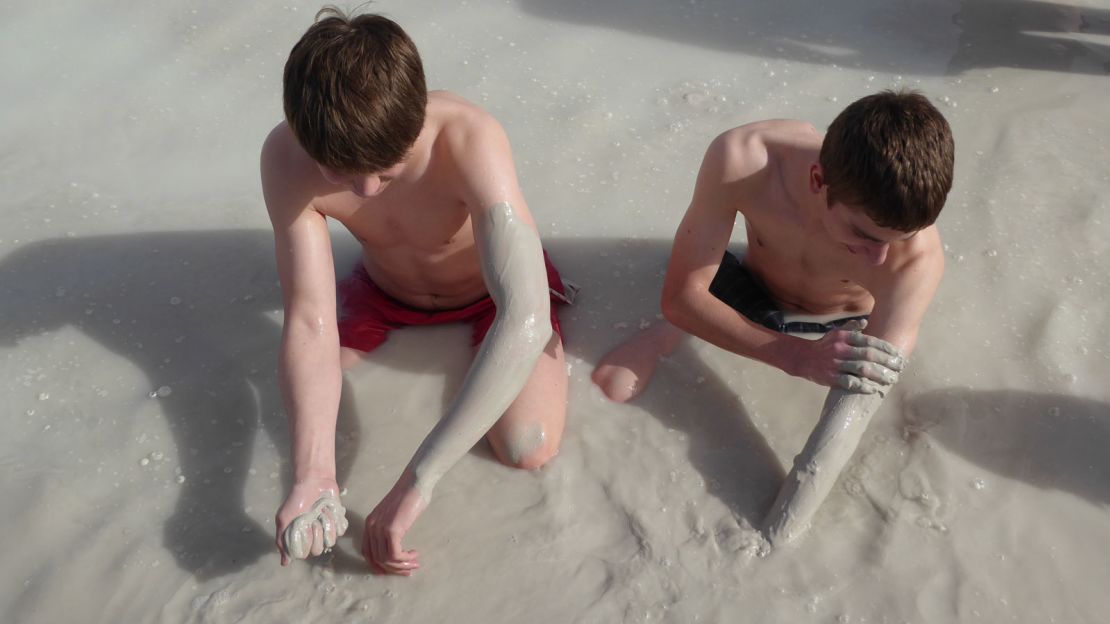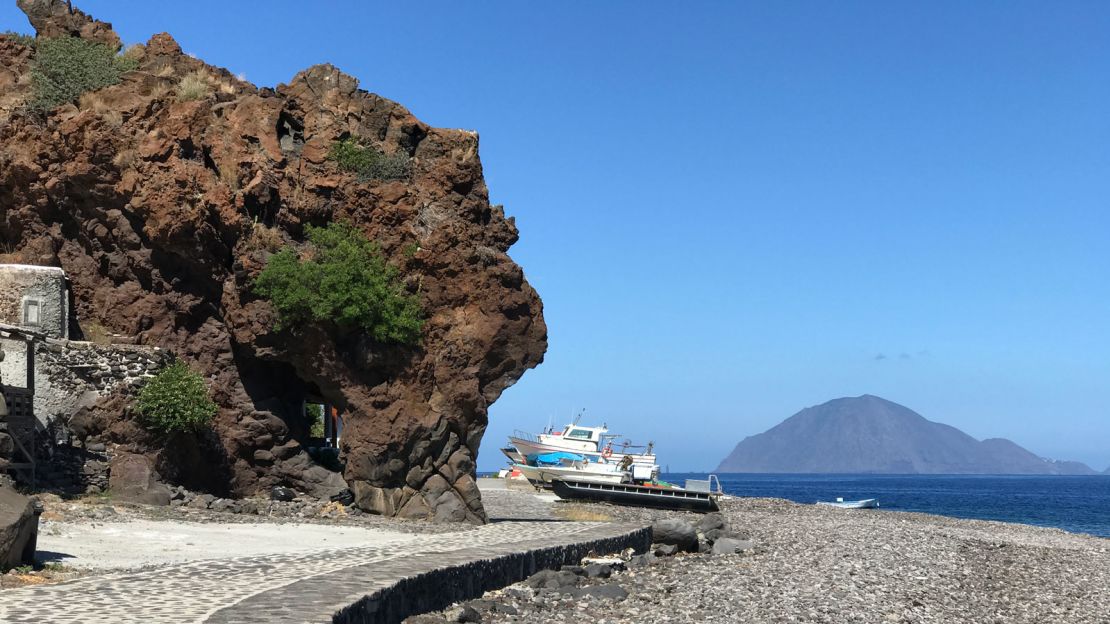Locals call them the “shape-shifting” or “floating” islands.
That’s because the Aeolian archipelago has been sculpted and destroyed by volcanic activity over the millennia.
Named after the powerful wind god Aeolus, the string of UNESCO-protected islands north of Sicily and west of mainland Italy offers a variety of volcanic landscapes and local color, each with its own unique character.
From the active cone of Stromboli to chic Panarea and car-free Alicudi, here’s how to enjoy the best of the Aeolian islands.
Filicudi

Nicknamed “Bone Island” because of the pirates who died here after long sieges, Filicudi is a place where unspoiled nature rules.
There are just two fishing villages and one road on the island, with steep stone paths connecting bright cottages.
Sea stacks such as “La Canna,” shaped like a cobra’s head, jut out of the emerald sea, while the black, green and red cliffs contain labyrinths of grottoes. Then there’s “Lovers’ Cave,” which is famous for its fertility power. In fact, “enter in two, exit in three” is a saying popular with locals.
It’s possible to explore Filicudi with Nino Terrano of I Delfini who rents scooters, dinghies and organizes dives, guided boat tours with sea-urchin bruschetta tasting, midnight fishing and sea-stack climbing.
Exercise trainer Simona De Stefani (+39 349 887 9963) holds yoga, shiatsu and fit walking sessions on the wild hilltops.
When it comes to dining options, Tavern La Sirena is a good option for fish fresh from the net.
Hotel restaurant La Canna is surrounded by fig trees and prickly pears and offers panoramic sea views. Run by Filicudi’s former postman, Pietro, the hotel and eatery features stone dwellings with typical Aeolian-style terraces made of columns and majolica benches. Menu specialties include vegetarian rolls fried in breadcrumbs.
The thatched umbrellas at pristine Joseph Beach are a good place to relax, while cozy Saloon bar is a good happy hour hotspot.
Stromboli

Stromboli is considered the most spectacular of the Aeolian Islands because of its volcanic activity. Visitors should prepare for a constant adrenaline rush, as the hyperactive “Black Giant” erupts every 15 minutes with smoky cannonball blasts and warm underwater bubbles. It’s flanked with huge scars from former lava flows.
The jet-black scenery clashes with the translucent aquamarine water and the white village running from the port to the lonely beach of Piscità.
Stromboli has long been associated with fertility, and residents often refer to it as the “aphrodisiac isle.” There’s even a “magical” citrus plant on the island which is thought to have helped couples conceive.
Expert guides Stromboli Fire Trekking offer a strenuous eight-hour trek to the crater for those keen to get closer to the volcano. When eruptions occur, people lie on their stomachs to feel the vibrations.
Local Pippo (+39 339 222 9714) organizes evening and daytime boat trips to admire the fireworks under starry skies as well as visits to the isolated fishermen’s village of Ginostra, popular for sunset aperitifs.
Le Sirenetta Park Hotel, a restyled 1800s farmhouse, serves delicious grouper dumplings wrapped in laurel leaves. They also take divers inside the 1,000-meter deep crater beside Strombolicchio, a dinosaur-shaped sea stack.
Il Gabbiano Relais, a former nightclub set in a luxuriant garden, has spacious deluxe apartments with pool and private panoramic rooftops. Owner Federica Masin organizes exclusive beach dinners and weddings.
Fresh fish delicacies and homemade pastries are served at Le Terrazze di Eolo.
READ: Going to Sicily? 10 things to know before your trip
Vulcano

Dubbed the “Mouth of Hell,” Vulcano is believed to be where Greek God of fire Hephaestus vented his anger over wife Aphrodite’s betrayals, so it seems fitting that it’s full of bubbling mud baths and hot springs.
Tourists flock to Vulcano’s steaming mud baths to spread “healing” lime mud (a mix of calcareous and sulfur debris) over their bodies before jumping into the sea, where underwater fumaroles (volcanic vents) act as natural hot tubs. Be warned, the scent of sulfur is very strong.
You can rent a kayak or a stand-up paddleboard to explore the lava sea tunnels and the pool of Aphrodite, which is where the lustful goddess apparently washed away her sins to be reborn a virgin.
Guided walks to the golden crater pass through the Valley of Monsters, which is full of bizarre animal-shaped magma shards.
Therasia Resort is a good location for sunset drinks, offering a unique view of all seven islands as the sky turns ablaze. Its Il Cappero restaurant boasts one Michelin star. There’s also restaurant Hotel Garden, which is situated near the popular black sand beach.
The offbeat, quiet Asino Beach bar (+393313071974) in the tiny village of Gelso is worth a visit. With thin black sand, reddish rocks, cactus and palms, its scenery is a mix between Mars and a desert shore.
Lipari

The largest Aeolian island is often viewed as a starting point to access the others, but Lipari has much to offer.
Its vibrant harbor boasts a lava fortress and one of the Mediterranean’s most stunning archaeological museums, Museo Archeologico Regionale Eoliano Luigi Bernabò Brea.
Quads and mountain bikes can be hired to explore the winding chaotic alleys, Arab-style palm courtyards and the ghost pumice quarries that have bleached many shores. You can also rent boats from Bartolo “Cantalanotte” (+39 333 590 6992) to visit inlets and nearby beaches such as Praia di Vinci.
White Beach (+39 338 709 5902), a former mine turned into a club, is known for its pure white pumice sand dunes. You’re likely to witness children rolling down these “whip-cream mountains” right into the clear waters.
Restaurant Le Macine, located in a lavish old villa with free shuttle service, makes typical Aeolian cuisine, while Mangia e Fui is renowned for its signature pistachio arancini rice balls.
Hotel options include Villa Enrica, an ancient farmhouse turned into a panoramic luxury resort, and Mea Hotel restaurant, which serves raw fish delicacies with orange sauces.
Mangia e Fui, Via Vittorio Emanuele; 94;+390909813505
Salina

Salina is famous for its sweet Malvasia passito wine and caper gourmet delicacies. Rumor has it that Admiral Horatio Nelson’s troops became very fond of Malvasia while patrolling Sicily in the 18th century.
The vineyards of the sweet amber-coloured wine cover two camel-shaped twin craters. Tastings take place at Azienda Agricola Gaetano Marchetta and Fenech.
Salina also has a luxuriant vegetation dotted with caper fields. The capers here are believed to be the best in the world and the island puts on a Caper Festival, held in Pollara, each year. You can rent a private taxi, bike or scooter and head to the tiny village, which is known for its impressive sunsets.
The coast is dotted with abandoned fishing grottos worth exploring on guided boat trips with local Angelo Zavone (+39 368 525 706).
Accommodation options include boutique Hotel Signum, which features pastel-colored cottages with private balconies, a panoramic terrace and an open-air spa that was once a stable. Its Michelin-starred restaurant serves fish delicacies and great Sicilian wine.
Panarea

Panarea is the tiniest of all the Aeolian Islands, but it’s also the most chic. VIPs and royals routinely flock here on flashy yachts. Dwellings are dazzling white, covered in bright pink bougainvilleas. Glitzy boutiques and elegant cafés line the neat winding alleys.
Other highlights are Zimmari, the island’s only sandy beach, Punta Milazzese, the location of the ruins of a prehistoric village, Cala Junco bay and the sea fumaroles at Calcara. It’s easy to get lost in Panarea’s jungle-like vegetation, but guided trekking tours are available if preferable.
Places to stay include Hycesia, a former old Aeolian villa which is now a cozy family-run resort of just a few designer rooms with a private garden.
The resort boasts one of the archipelago’s top restaurants, with chef Gaetano Nanì at the helm. Raw red king prawns with Sicilian finger lime are among his specialties.
MORE: Zannone – Italy’s forbidden ‘orgy island’
Alicudi

The most faraway island is so secluded that Saracen pirates once used it as a hiding place.
Silence and isolation rule here, and time has frozen. So forget cars, scooters and even bikes. There are no roads, only dusty mule paths that unwind for 25 kilometers, while more than 10,000 stone steps connect the areas.
Donkey taxis (Bartolino, +39 340 982 8648) are a luxury just for your luggage. There are no ATMs, boutiques, clubs or cigarette vendors. Not even electricity at night, just the stars as natural flashlights.
Colorful dwellings are built inside weird mushroom-shaped rocks and natural arches dot the pebble beach. The few residents here turn their homes into summer B&Bs.
Ericusa is the only hotel restaurant, and its owners often take guests on guided trekking tours and make them gourmet stuffed squids.
Fishing and boat tours (Arduccio Barbuto, +39 340 764 8001) leave from the tiny harbor where fishermen sell their morning catch.
Silvia Marchetti is a Rome-based freelance reporter. She writes about finance, economics, travel and culture for a wide range of media including MNI News, Newsweek and The Guardian.

















